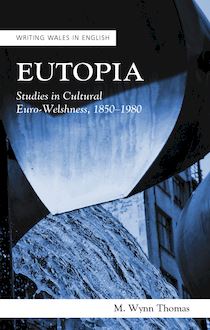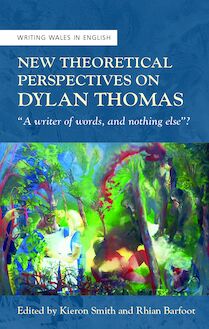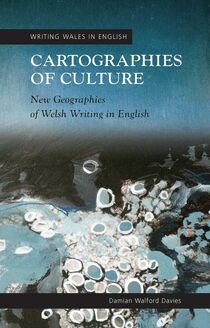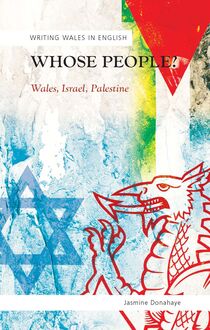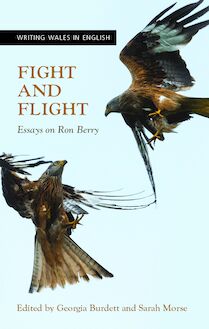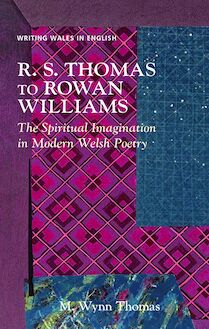Animals, Animality and Controversy in Modern Welsh Literature and Culture , livre ebook
156
pages
English
Ebooks
2022
Vous pourrez modifier la taille du texte de cet ouvrage
Obtenez un accès à la bibliothèque pour le consulter en ligne En savoir plus
Découvre YouScribe en t'inscrivant gratuitement
Découvre YouScribe en t'inscrivant gratuitement
156
pages
English
Ebooks
2022
Vous pourrez modifier la taille du texte de cet ouvrage
Obtenez un accès à la bibliothèque pour le consulter en ligne En savoir plus
Publié par
Date de parution
15 novembre 2022
Nombre de lectures
1
EAN13
9781786839398
Langue
English
This pioneering study introduces readers to key themes from animal studies, as a frame within which it examines the representation of animals and animality in the work of a range of authors. In this new approach to animal studies, the concept of a relational universe that has emerged in recent natural and physical science is argued as being central. With fresh readings of Welsh literary and non-literary publications, including the Welsh press and Welsh-language manuals, the book explores relationships among animals and between humans and animals, to approach subjects such as intelligence, sensibility and knowledge from an animal perspective. The possibility of redrawing and reclaiming a history of rural and industrial Wales is suggested according to an animal history and agenda. This innovative contribution to Welsh and animal studies illuminates fascinating and controversial subjects, including animal domestication, captivity, communication, biopsychology, human exceptionalism, zoos and farming.
Series Editors’ Preface
Acknowledgements
Overview
1 Animals and Animality in a Relational Universe
2 Rethinking Animal Contexts: Rural and Industrial Wales
3 Emerging Animalities in the Victorian and Edwardian Welsh Press
4 Exotic Pets and Spectacular Entertainments
5 Brief Encounters
6 Birds Over Wales
7 Domestication and ‘Domesecration’
8 Children’s Book Pets
9 Conflicting Cosmologies: Three Stories by Gwyn Jones
10 Entangled Empathies: Gillian Clarke and Keith Bowen
Afterword
Notes
Select Bibliography
Index
Publié par
Date de parution
15 novembre 2022
Nombre de lectures
1
EAN13
9781786839398
Langue
English
A NIMALS , A NIMALITY AND C ONTROVERSY IN M ODERN W ELSH L ITERATURE AND C ULTURE
WRITING WALES IN ENGLISH
CREW series of Critical and Scholarly Studies
General Editors: Kirsti Bohata and Daniel G. Williams ( CREW , Swansea University)
This CREW series is dedicated to Emyr Humphreys, a major figure in the literary culture of modern Wales, a founding patron of the Centre for Research into the English Literature and Language of Wales . Grateful thanks are due to the late Richard Dynevor for making this series possible.
Other titles in the series
Stephen Knight, A Hundred Years of Fiction (978-0-7083-1846-1)
Barbara Prys-Williams, Twentieth-Century Autobiography (978-0-7083-1891-1)
Kirsti Bohata, Postcolonialism Revisited (978-0-7083-1892-8)
Chris Wigginton, Modernism from the Margins (978-0-7083-1927-7)
Linden Peach, Contemporary Irish and Welsh Women’s Fiction (978-0-7083-1998-7)
Sarah Prescott, Eighteenth-Century Writing from Wales: Bards and Britons (978-0-7083-2053-2)
Hywel Dix, After Raymond Williams: Cultural Materialism and the Break-Up of Britain (978-0-7083-2153-9)
Matthew Jarvis, Welsh Environments in Contemporary Welsh Poetry (978-0-7083-2152-2)
Harri Garrod Roberts, Embodying Identity: Representations of the Body in Welsh Literature (978-0-7083-2169-0)
Diane Green, Emyr Humphreys: A Postcolonial Novelist (978-0-7083-2217-8)
M. Wynn Thomas, In the Shadow of the Pulpit: Literature and Nonconformist Wales (978-0-7083-2225-3)
Linden Peach, The Fiction of Emyr Humphreys: Contemporary Critical Perspectives (978-0-7083-2216-1)
Daniel Westover, R. S. Thomas: A Stylistic Biography (978-0-7083-2413-4)
Jasmine Donahaye, Whose People? Wales, Israel, Palestine (978-0-7083-2483-7)
Judy Kendall, Edward Thomas: The Origins of His Poetry (978-0-7083-2403-5)
Damian Walford Davies, Cartographies of Culture: New Geographies of Welsh Writing in English (978-0-7083-2476-9)
Daniel G. Williams, Black Skin, Blue Books: African Americans and Wales 1845–1945 (978-0-7083-1987-1)
Andrew Webb, Edward Thomas and World Literary Studies: Wales, Anglocentrism and English Literature (978-0-7083-2622-0)
Alyce von Rothkirch, J. O. Francis, realist drama and ethics: Culture, place and nation (978-1-7831-6070-9)
Rhian Barfoot, Liberating Dylan Thomas: Rescuing a Poet from Psycho-Sexual Servitude (978-1-7831-6184-3)
Daniel G. Williams, Wales Unchained: Literature, Politics and Identity in the American Century (978-1-7831-6212-3)
M. Wynn Thomas, The Nations of Wales 1890–1914 (978-1-78316-837-8)
Richard McLauchlan, Saturday’s Silence: R. S. Thomas and Paschal Reading (978-1-7831-6920-7)
Bethan M. Jenkins, Between Wales and England: Anglophone Welsh Writing of the Eighteenth Century (978-1-7868-3029-6)
M. Wynn Thomas, All that is Wales: The Collected Essays of M. Wynn Thomas (978-1-7868-3088-3)
Laura Wainwright, New Territories in Modernism: Anglophone Welsh Writing , 1930–1949 (978-1-7868-3217-7)
Siriol McAvoy, Locating Lynette Roberts: ‘Always Observant and Slightly Obscure’ (978-1-7868-3382-2)
Linden Peach, Pacifism, Peace and Modern Welsh Writing (978-1-7868-3402-7)
Kieron Smith, John Ormond’s Organic Mosaic (978-1-7868-3488-1)
Georgia Burdett and Sarah Morse (eds), Fight and Flight: Essays on Ron Berry (978-1-7868-3528-4)
M. Wynn Thomas, Eutopia: Studies in Cultural Euro-Welshness, 1850–1980 (978-1-78683-614-4)
A NIMALS , A NIMALITY AND C ONTROVERSY IN M ODERN W ELSH L ITERATURE AND C ULTURE
WRITING WALES IN ENGLISH
L INDEN P EACH
© Linden Peach, 2022
All rights reserved. No part of this book may be reproduced in any material form (including photocopying or storing it in any medium by electronic means and whether or not transiently or incidentally to some other use of this publication) without the written permission of the copyright owner. Applications for the copyright owner’s written permission to reproduce any part of this publication should be addressed to the University of Wales Press, University Registry, King Edward VII Avenue, Cardiff CF10 3NS.
www.uwp.co.uk
British Library CIP Data
A catalogue record for this book is available from the British Library.
ISBN: 978-1-78683-937-4
e-ISBN: 978-1-78683-939-8
The right of Linden Peach to be identified as author of this work has been asserted in accordance with sections 77 and 79 of the Copyright, Designs and Patents Act 1988.
The publisher acknowledges the financial support of the Books Council of Wales.
The publisher has no responsibility for the persistence or accuracy of URLs for any external or third-party internet websites referred to in this book, and does not guarantee that any content on such websites is, or will remain, accurate or appropriate.
C ONTENTS
Series Editors’ Preface
Acknowledgements
Overview
1 Animals and Animality in a Relational Universe
2 Rethinking Animal Contexts: Rural and Industrial Wales
3 Emerging Animalities in the Victorian and Edwardian Welsh Press
4 Exotic Pets and Spectacular Entertainments
5 Brief Encounters
6 Birds over Wales
7 Domestication and ‘Domesecration’
8 The Children’s Book Pet
9 Conflicting Cosmologies: Three Stories by Gwyn Jones
10 Entangled Empathies: Gillian Clarke and Keith Bowen
Afterword
Notes
Select Bibliography
S ERIES E DITORS’ P REFACE
The aim of this series, since its founding in 2004 by Professor M. Wynn Thomas, is to publish scholarly and critical work by established specialists and younger scholars that reflects the richness and variety of the English-language literature of modern Wales. The studies published so far have amply demonstrated that concepts, models and discourses current in the best contemporary studies can illuminate aspects of Welsh culture, and have also foregrounded the potential of the Welsh example to draw attention to themes that are often neglected or marginalised in anglophone cultural studies. The series defines and explores that which distinguishes Wales’s anglophone literature, challenges critics to develop methods and approaches adequate to the task of interpreting Welsh culture, and invites its readers to locate the process of writing Wales in English within comparative and transnational contexts.
Professor Kirsti Bohata and Professor Daniel G. Williams
Founding Editor: Professor M. Wynn Thomas (2004–15)
CREW ( Centre for Research into the English Literature and Language of Wales ) Swansea University
i Angela, Kate and Matthew
Bee
A dark, velvet chocolate,
unmoving. In changing light,
becoming the colour of coffee.
Tiny, fragile wings, like rice paper,
lifting slowly from its body,
legs extended, turning its weight
toward my naked finger, my spoon
which is not vulnerable,
before rising, like a helicopter,
into its disappearance.
A CKNOWLEDGEMENTS
Like all books by teachers in higher education, especially those that chart new territory, this work has benefited from discussions with students and colleagues and participation in conferences and research seminars in the UK and across the world. I am grateful to all at the Prince’s School of Traditional Arts, especially my Doctoral students, who have contributed to the development of my thoughts and arguments in ways in which some of them may not even be fully aware.
I have been inspired by colleagues and scholars who have argued for, and have demonstrated in their own works, an interdisciplinary approach to the literature, history and geography of Wales and especially by those who have pursued relationships between Welsh- and English-language writings. Above all, I am indebted to the works, cited in this book, that have opened up for us the interconnections between animal studies and the relational cosmology revealed by the natural and physical sciences.
I am grateful for the encouragement and support of the University of Wales Press, especially Dr Llion Wigley (commissioning editor, Welsh Language and Topics) and his colleagues in the production and marketing divisions.
Many authors are indebted to the patience and support of their families who are up to their necks in their own projects, and, once again, I am pleased to gratefully acknowledge my wife, Angela, and Kate and Matthew to whom this book is dedicated.
O VERVIEW
Given that human–animal encounters permeate Welsh- and English-language Welsh writing, it is disappointing that they have received so little critical attention. This book is intended to introduce readers to a broad range of ideas and themes in animal studies and provide frameworks within which to discuss modern Welsh writing about animals and animality.
Chapter 1 introduces some of the more significant scholars, important texts and key themes in contemporary animal studies, including the animal and human divide; human exceptionalism; the concept of animality and how animals have been defined and hidden by cultural taxonomies; animal intelligence, cognition and emotional capacity; animal rights; the diverse and complex communication systems of animals; animal history; the domestication and captivity of animals; post-humanism and the ecological approach to animal studies. It argues that contemporary animal studies reflects, and engages with, the cosmology of a ‘relational’ universe in which all living things are interconnected as has been revealed in the natural and physical sciences and brought to the fore by contemporary physicists, such as Lee Smolin and Carlo Rovelli, and social scientists such as Roberto Mangabeira Unger and, more recently, Milja Kurki.
Drawing, as do subsequent chapters, on the insights and themes introduced in Chapter 1 , Chapter 2 suggests how animal contexts in rural and industrial Wales might be rethought from an animal’s perspective and agenda. Drawing on animal theory, literary texts and other cultural and educational publications, it examines the impact on animals (in modern Welsh history and contemporary society) of, for example, the Welsh landscape (with reference to the Welsh countryside memoir) and
